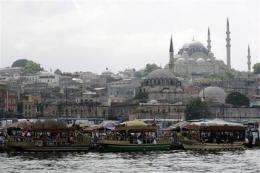Turkey ill-prepared for earthquake

(AP) -- More than a decade after a devastating earthquake revealed dangerously shoddy construction across Turkey, authorities are failing to enforce stricter building codes and protect people from another deadly quake, according to a new parliamentary report obtained by The Associated Press.
Many of the roughly 18,000 people killed by 1999 quakes in western Turkey died in cheaply made housing blocks that pancaked into the ground and turned out to have never been inspected by authorities. Many people were surprised to see how the rubble of their homes broke into pieces or turned into dust with a poke. Closer inspection revealed that much of the cement lacked metal reinforcing bars, or was mixed with large amounts of sand that made it unstable.
New building codes were imposed requiring plans to be prepared by authorized architects and construction engineers and approved by inspectors before building begins. Authorized engineers are also supposed to inspect the construction while it's under way to make sure the quality of cement is fine and sufficient steel rods are used during the building.
But the report prepared by a parliamentary research commission and recently submitted to lawmakers says Turkey has failed to improve city planning, reinforce substandard buildings, control urban development and punish people who violate building codes.
"There are no deterrent sanctions for actions that violate laws and regulations," it says.
The report says several Turkish cities are at risk from quakes, most notably Istanbul, a city that sits near a major fault line and has grown to 15 million as migration from the poor east of the country swelled the population from about 1 million in 1960. Tens of thousands of structures have been erected in violation of building codes.
Geologists have strongly urged the Turkish government to tear down some 40,000 buildings that would probably collapse if a big quake hits Istanbul. They say hundreds of thousands of other unstable buildings need to be reinforced.
The government so far has reinforced hundreds of hospitals, schools or other government buildings, along with viaducts and bridges. It says, however, that finding the resources to reinforce the majority of the risky buildings and move their residents to other places is a major challenge despite a recent economic boom.
The report noted that decision-making process is solely run by senior officials and not local administrations and the danger of disasters has been neglected in city planning.
"No real inspection methods have been applied to the city planning or construction of buildings," it said.
"The earthquake risk in the city has increased because of overcrowding, faulty land-use planning and construction, inadequate infrastructure and services, and environmental degradation," said a separate scientific study by Prof. Mustafa Erdik, head of the Istanbul-based Kandilli Observatory and Earthquake Research Institute and Prof. Eser Durukal, also from Kandilli. "The greatest effect on reduction of human casualties in Istanbul could be achieved by retrofit/rehabilitation of existing building stock."
The 2007 study by Erdik and Durukal says a magnitude 7.5 earthquake in Istanbul could cause up to 40,000 fatalities, 120,000 injuries and noted that the casualty figure estimates were almost 10 times higher than those that would result from a similar quake in San Francisco or Tokyo.
"There are many more things to do," said Eren Uckan, an expert on earthquake engineering at King Saud University in Riyadh, Saudi Arabia. "The earthquake safety of industrial facilities and lifelines (roads and bridges) is very important to prevent post-earthquake damages, chemical spills and fires."
©2010 The Associated Press. All rights reserved. This material may not be published, broadcast, rewritten or redistributed.















